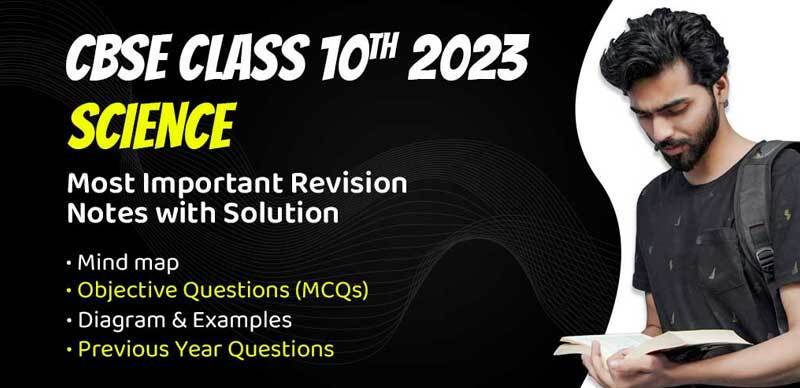Well-prepared Class 10th Science Notes can help students understand the concepts, topics and themes covered in all the chapters. The Revision Notes for Class 10 Science offered by Vedantu are based on the latest curriculum that is approved by CBSE. Students don’t have to stress about finding multiple books to revise during the exam period with such handy notes. The key benefit of these Notes of Science Class 10 is that they cover all the essential pointers, explain diagrams with examples that allow students to score well in the exams.
Vedantu is a platform that provides free NCERT Solutions and other study materials for students. You can download Class 10 Maths NCERT Solutions to help you to revise complete syllabus and score more marks in your examinations.
CBSE (Central Board of Secondary Education) is a renowned national-level educational board in India, established on November 3, 1962, operating under the Ministry of Education. It is responsible for designing the curriculum and syllabus for classes 1 to 12 and setting educational standards for schools affiliated with it. The board conducts the Class 10 (Secondary School Examination) and Class 12 (Senior School Certificate Examination) board exams annually, making them significant milestones in a student’s academic journey. CBSE introduced the grading system to evaluate students’ performance holistically, reducing the pressure of traditional marks-based evaluation. The board also emphasizes teacher training and development through workshops and orientation programs, aiming to enhance teaching methodologies and improve the overall quality of education. A notable feature of CBSE is the Continuous and Comprehensive Evaluation (CCE) system, which assesses students’ progress throughout the year, encompassing both formative and summative assessments. CBSE promotes innovation, research, and project-based learning, encouraging students to develop critical thinking and creativity. It also recognizes the importance of sports, arts, and co-curricular activities in a student’s holistic development and encourages schools to provide ample opportunities in these areas. Embracing digital initiatives, CBSE leverages technology for online registration, exam processes, and study materials to facilitate efficient learning and accessibility. Additionally, CBSE offers various scholarship schemes to support deserving and meritorious students in pursuing higher education. CBSE’s overarching vision is to provide quality education, instill essential values, and equip students with the necessary knowledge and skills to excel in their future endeavors and contribute positively to society.

Download CBSE Class 10 Science Revision Notes 2023-24 PDF
Also, check CBSE Class 10 Science revision notes for All chapters:
As of Cbse update in September 2023, Class 10 Science typically covers a wide range of topics. While the specific curriculum might vary depending on the education board or country, some important topics commonly covered in Class 10 Science are as follows:-
- Chemical Reactions and Equations: This includes types of chemical reactions, balancing chemical equations, and understanding the effects of chemical reactions in everyday life.
- Acids, Bases, and Salts: Properties of acids and bases, pH scale, types of salts, and their usage are important topics in this section.
- Metals and Non-Metals: The properties of metals and non-metals, their reactivity series, and their various uses are commonly taught in this chapter.
- Carbon and its Compounds: Understanding the bonding of carbon, different types of carbon compounds, and their importance in daily life and the environment.
- Periodic Classification of Elements: Students learn about the periodic table, the arrangement of elements, and the trends in properties across periods and groups.
- Life Processes: This chapter covers vital processes in living organisms, such as nutrition, respiration, transportation, excretion, and reproduction.
- Control and Coordination: Understanding the nervous system, endocrine system, and the process of coordination in plants and animals.
- Heredity and Evolution: Study of genetics, heredity, and the process of evolution by natural selection.
- Light Reflection and Refraction: The behavior of light when it passes through different media and how it is reflected or refracted.
- Human Eye and Colourful World: The working of the human eye, common eye defects, and the formation of a rainbow.
- Electricity: Understanding electric circuits, Ohm’s law, and the practical applications of electricity.
- Magnetic Effects of Electric Current: Study of magnetic fields, electromagnetism, and applications of electromagnets.
- Sources of Energy: Different sources of energy, their advantages, disadvantages, and the importance of renewable energy sources.
- Our Environment: Topics related to ecosystem, food chains, waste management, and conservation of natural resources.
- Management of Natural Resources: Sustainable management of resources like water, forests, and wildlife.
![[PDF] Science Term 2 Chapterwise Previous Year Question | CBSE CLASS 10 | CBSE JEE NEET](https://cbsejeeneet.com/wp-content/uploads/2022/03/1646302594152879-0.jpg)
![[PDF] DOWNLOAD SST BOOKLETS OF SHOBHIT NIRWAN CLASS 10 | CBSE CLASS 10 | CBSE JEE NEET](https://cbsejeeneet.com/wp-content/uploads/2022/03/1646547052320384-0.jpg)
![[PDF] Arihant Term 2 Sample Papers for Class 10 Download | CBSE Class 10 | CBSE JEE NEET](https://cbsejeeneet.com/wp-content/uploads/2022/03/1647793555208564-0.jpg)
![[PDF] Super 20 Sample Papers Class 10 Term 2 | CBSE Class 10 | CBSE JEE NEET](https://cbsejeeneet.com/wp-content/uploads/2022/03/1647794818176566-0.jpg)
![[Pdf] Download Class 10 Bkp Science, Social Science And Maths Cheat Sheet – By Bhai Ki Padhai – CBSE JEE NEET](https://cbsejeeneet.com/wp-content/uploads/2022/03/1647850138936063-0.jpg)
![[PDF] Arihant CBSE Term 2 Question Banks for Class 10 Download | CBSE Class 10 | CBSE JEE NEET](https://cbsejeeneet.com/wp-content/uploads/2022/03/1647876516088896-0.jpg)